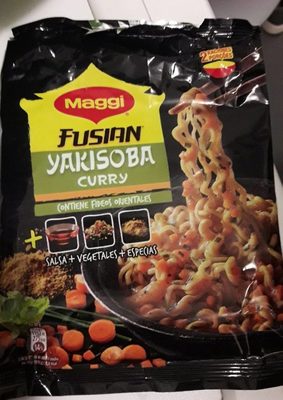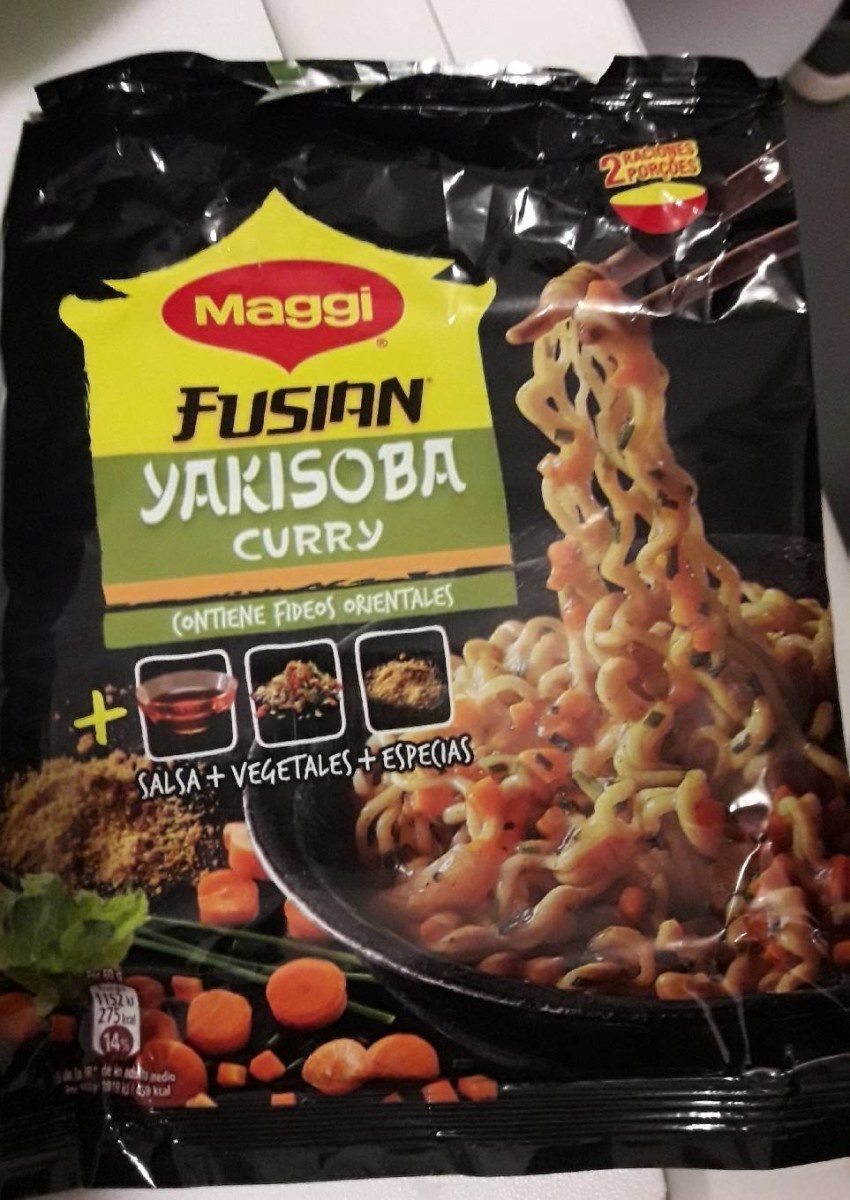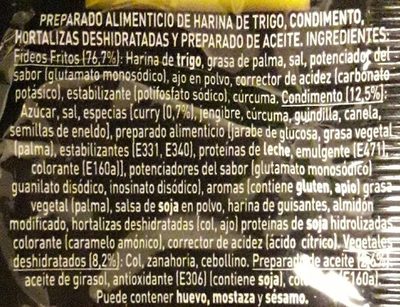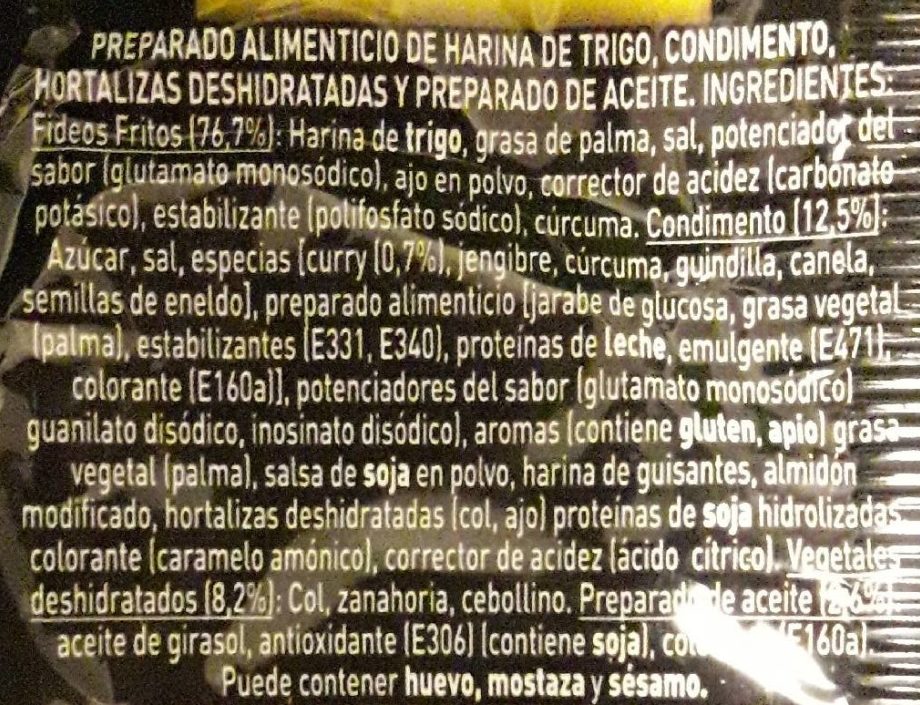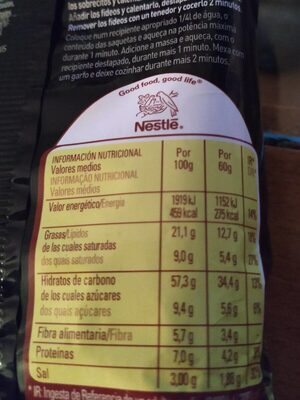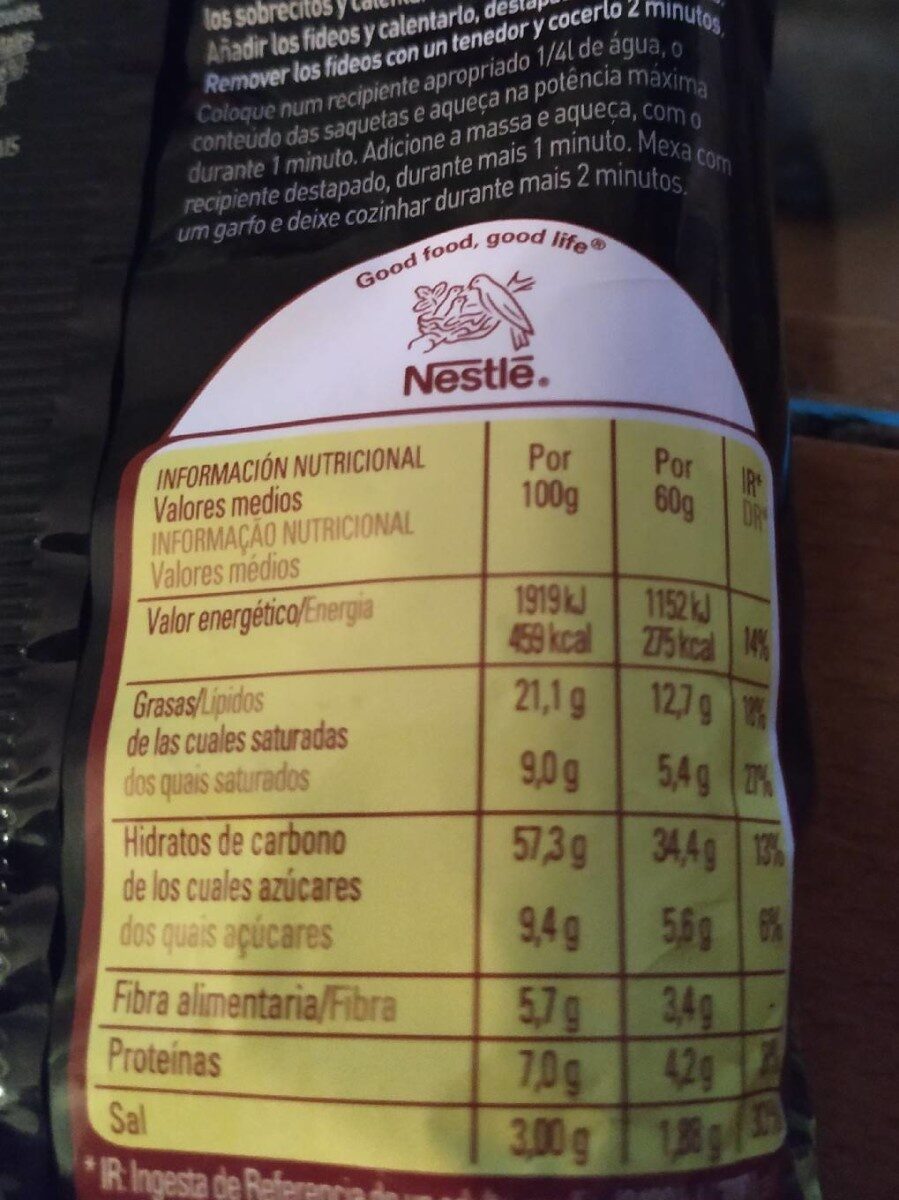Help us make food transparency the norm!
As a non-profit organization, we depend on your donations to continue informing consumers around the world about what they eat.
The food revolution starts with you!
Fusian yakisoba fideos sabor curry - Maggi - 120 g
Fusian yakisoba fideos sabor curry - Maggi - 120 g
This product page is not complete. You can help to complete it by editing it and adding more data from the photos we have, or by taking more photos using the app for Android or iPhone/iPad. Thank you!
×
Barcode: 7613031923328 (EAN / EAN-13)
Quantity: 120 g
Packaging: Bag
Brands: Maggi
Categories: Plant-based foods and beverages, Plant-based foods, Cereals and potatoes, Cereals and their products, Dried products, Pastas, Dried products to be rehydrated, Noodles, Instant noodles, Soba, Tagliatelle
Matching with your preferences
Health
Ingredients
-
55 ingredients
: Fideos Fritos (76,7%): Harina de trigo, grasa de palma, sal, potenciador de sabor (glutamato monosódico), ajo en polvo, corrector de acidez (carbonato potásico, estabilizante (polifosfato sódico, cúrcuma. Condimento (12,5% Azúcar, sal, especias (curry (0,7%), jengibre, cúrcuma,guindilla, canela, semillas de eneldo, preparado alimenticio (jarabe de glucosa, grasa vegetal palma), estabilizantes (E331, E340), proteínas de leche, emulgente (E471, colorante (E160a), potenciadores del sabor glutamato monosódico, guanilato disódico, inosinato disódico, aromas (contiene gluten, apio) grasa vegetal (palma, salsa de soja en polvo, harina de guisantes, almidon modificado, hortalizas deshidratadas (col, ajo, proteinas de soja hidrolizadas, colorante (caramelo amónico), corrector de acidez (ácido cítrico). Vegetales deshidratados (8,2%: Col, zanahoria, cebollino.Allergens: Celery, Gluten, Milk, SoybeansTraces: Eggs, Mustard, Sesame seeds
Food processing
-
Ultra processed foods
Elements that indicate the product is in the 4 - Ultra processed food and drink products group:
- Additive: E14XX - Modified Starch
- Additive: E150c - Ammonia caramel
- Additive: E160a - Carotene
- Additive: E452 - Polyphosphates
- Additive: E471 - Mono- and diglycerides of fatty acids
- Additive: E621 - Monosodium glutamate
- Additive: E627 - Disodium guanylate
- Additive: E631 - Disodium inosinate
- Ingredient: Colour
- Ingredient: Emulsifier
- Ingredient: Flavour enhancer
- Ingredient: Flavouring
- Ingredient: Glucose
- Ingredient: Glucose syrup
- Ingredient: Milk proteins
Food products are classified into 4 groups according to their degree of processing:
- Unprocessed or minimally processed foods
- Processed culinary ingredients
- Processed foods
- Ultra processed foods
The determination of the group is based on the category of the product and on the ingredients it contains.
Additives
-
E160a - Carotene
Carotene: The term carotene -also carotin, from the Latin carota, "carrot"- is used for many related unsaturated hydrocarbon substances having the formula C40Hx, which are synthesized by plants but in general cannot be made by animals -with the exception of some aphids and spider mites which acquired the synthesizing genes from fungi-. Carotenes are photosynthetic pigments important for photosynthesis. Carotenes contain no oxygen atoms. They absorb ultraviolet, violet, and blue light and scatter orange or red light, and -in low concentrations- yellow light. Carotenes are responsible for the orange colour of the carrot, for which this class of chemicals is named, and for the colours of many other fruits, vegetables and fungi -for example, sweet potatoes, chanterelle and orange cantaloupe melon-. Carotenes are also responsible for the orange -but not all of the yellow- colours in dry foliage. They also -in lower concentrations- impart the yellow coloration to milk-fat and butter. Omnivorous animal species which are relatively poor converters of coloured dietary carotenoids to colourless retinoids have yellowed-coloured body fat, as a result of the carotenoid retention from the vegetable portion of their diet. The typical yellow-coloured fat of humans and chickens is a result of fat storage of carotenes from their diets. Carotenes contribute to photosynthesis by transmitting the light energy they absorb to chlorophyll. They also protect plant tissues by helping to absorb the energy from singlet oxygen, an excited form of the oxygen molecule O2 which is formed during photosynthesis. β-Carotene is composed of two retinyl groups, and is broken down in the mucosa of the human small intestine by β-carotene 15‚15'-monooxygenase to retinal, a form of vitamin A. β-Carotene can be stored in the liver and body fat and converted to retinal as needed, thus making it a form of vitamin A for humans and some other mammals. The carotenes α-carotene and γ-carotene, due to their single retinyl group -β-ionone ring-, also have some vitamin A activity -though less than β-carotene-, as does the xanthophyll carotenoid β-cryptoxanthin. All other carotenoids, including lycopene, have no beta-ring and thus no vitamin A activity -although they may have antioxidant activity and thus biological activity in other ways-. Animal species differ greatly in their ability to convert retinyl -beta-ionone- containing carotenoids to retinals. Carnivores in general are poor converters of dietary ionone-containing carotenoids. Pure carnivores such as ferrets lack β-carotene 15‚15'-monooxygenase and cannot convert any carotenoids to retinals at all -resulting in carotenes not being a form of vitamin A for this species-; while cats can convert a trace of β-carotene to retinol, although the amount is totally insufficient for meeting their daily retinol needs.Source: Wikipedia
-
E330 - Citric acid
Citric acid is a natural organic acid found in citrus fruits such as lemons, oranges, and limes.
It is widely used in the food industry as a flavor enhancer, acidulant, and preservative due to its tart and refreshing taste.
Citric acid is safe for consumption when used in moderation and is considered a generally recognized as safe (GRAS) food additive by regulatory agencies worldwide.
-
E331 - Sodium citrates
Sodium citrate: Sodium citrate may refer to any of the sodium salts of citrate -though most commonly the third-: Monosodium citrate Disodium citrate Trisodium citrateThe three forms of the salt are collectively known by the E number E331. Sodium citrates are used as acidity regulators in food and drinks, and also as emulsifiers for oils. They enable cheeses to melt without becoming greasy.Source: Wikipedia
-
E340 - Potassium phosphates
Potassium phosphate: Potassium phosphate is a generic term for the salts of potassium and phosphate ions including: Monopotassium phosphate -KH2PO4- -Molar mass approx: 136 g/mol- Dipotassium phosphate -K2HPO4- -Molar mass approx: 174 g/mol- Tripotassium phosphate -K3PO4- -Molar mass approx: 212.27 g/mol-As food additives, potassium phosphates have the E number E340.Source: Wikipedia
-
E471 - Mono- and diglycerides of fatty acids
Mono- and diglycerides of fatty acids (E471), are food additives commonly used as emulsifiers in various processed foods.
These compounds consist of glycerol molecules linked to one or two fatty acid chains, which help stabilize and blend water and oil-based ingredients. E471 enhances the texture and shelf life of products like margarine, baked goods, and ice cream, ensuring a smooth and consistent texture.
It is generally considered safe for consumption within established regulatory limits.
-
E501 - Potassium carbonates
Potassium carbonate: Potassium carbonate -K2CO3- is a white salt, which is soluble in water -insoluble in ethanol- and forms a strongly alkaline solution. It can be made as the product of potassium hydroxide's absorbent reaction with carbon dioxide. It is deliquescent, often appearing a damp or wet solid. Potassium carbonate is used in the production of soap and glass.Source: Wikipedia
-
E501i - Potassium carbonate
Potassium carbonate: Potassium carbonate -K2CO3- is a white salt, which is soluble in water -insoluble in ethanol- and forms a strongly alkaline solution. It can be made as the product of potassium hydroxide's absorbent reaction with carbon dioxide. It is deliquescent, often appearing a damp or wet solid. Potassium carbonate is used in the production of soap and glass.Source: Wikipedia
-
E621 - Monosodium glutamate
Monosodium glutamate: Monosodium glutamate -MSG, also known as sodium glutamate- is the sodium salt of glutamic acid, one of the most abundant naturally occurring non-essential amino acids. Glutamic acid is found naturally in tomatoes, grapes, cheese, mushrooms and other foods.MSG is used in the food industry as a flavor enhancer with an umami taste that intensifies the meaty, savory flavor of food, as naturally occurring glutamate does in foods such as stews and meat soups. It was first prepared in 1908 by Japanese biochemist Kikunae Ikeda, who was trying to isolate and duplicate the savory taste of kombu, an edible seaweed used as a base for many Japanese soups. MSG as a flavor enhancer balances, blends, and rounds the perception of other tastes.The U.S. Food and Drug Administration has given MSG its generally recognized as safe -GRAS- designation. A popular belief is that large doses of MSG can cause headaches and other feelings of discomfort, known as "Chinese restaurant syndrome," but double-blind tests fail to find evidence of such a reaction. The European Union classifies it as a food additive permitted in certain foods and subject to quantitative limits. MSG has the HS code 29224220 and the E number E621.Source: Wikipedia
-
E627 - Disodium guanylate
Disodium guanylate: Disodium guanylate, also known as sodium 5'-guanylate and disodium 5'-guanylate, is a natural sodium salt of the flavor enhancing nucleotide guanosine monophosphate -GMP-. Disodium guanylate is a food additive with the E number E627. It is commonly used in conjunction with glutamic acid. As it is a fairly expensive additive, it is not used independently of glutamic acid; if disodium guanylate is present in a list of ingredients but MSG does not appear to be, it is likely that glutamic acid is provided as part of another ingredient such as a processed soy protein complex. It is often added to foods in conjunction with disodium inosinate; the combination is known as disodium 5'-ribonucleotides. Disodium guanylate is produced from dried seaweed and is often added to instant noodles, potato chips and other snacks, savory rice, tinned vegetables, cured meats, and packaged soup.Source: Wikipedia
-
E631 - Disodium inosinate
Disodium inosinate: Disodium inosinate -E631- is the disodium salt of inosinic acid with the chemical formula C10H11N4Na2O8P. It is used as a food additive and often found in instant noodles, potato chips, and a variety of other snacks. Although it can be obtained from bacterial fermentation of sugars, it is often commercially prepared from animal sources.Source: Wikipedia
Ingredients analysis
-
Palm oil
Ingredients that contain palm oil: Palm fat, Palm fat, Palm
-
Non-vegan
Non-vegan ingredients: Milk proteinsSome ingredients could not be recognized.
We need your help!
You can help us recognize more ingredients and better analyze the list of ingredients for this product and others:
- Edit this product page to correct spelling mistakes in the ingredients list, and/or to remove ingredients in other languages and sentences that are not related to the ingredients.
- Add new entries, synonyms or translations to our multilingual lists of ingredients, ingredient processing methods, and labels.
If you would like to help, join the #ingredients channel on our Slack discussion space and/or learn about ingredients analysis on our wiki. Thank you!
-
Vegetarian status unknown
Unrecognized ingredients: es:preparado-alimenticioSome ingredients could not be recognized.
We need your help!
You can help us recognize more ingredients and better analyze the list of ingredients for this product and others:
- Edit this product page to correct spelling mistakes in the ingredients list, and/or to remove ingredients in other languages and sentences that are not related to the ingredients.
- Add new entries, synonyms or translations to our multilingual lists of ingredients, ingredient processing methods, and labels.
If you would like to help, join the #ingredients channel on our Slack discussion space and/or learn about ingredients analysis on our wiki. Thank you!
-
Details of the analysis of the ingredients
We need your help!
Some ingredients could not be recognized.
We need your help!
You can help us recognize more ingredients and better analyze the list of ingredients for this product and others:
- Edit this product page to correct spelling mistakes in the ingredients list, and/or to remove ingredients in other languages and sentences that are not related to the ingredients.
- Add new entries, synonyms or translations to our multilingual lists of ingredients, ingredient processing methods, and labels.
If you would like to help, join the #ingredients channel on our Slack discussion space and/or learn about ingredients analysis on our wiki. Thank you!
: Fideos 76.7% (Harina de trigo), grasa de palma, sal, potenciador de sabor (glutamato monosódico), ajo, corrector de acidez, carbonato potásico, estabilizante, polifosfato sódico, cúrcuma, Condimento, Azúcar 12.5%, sal, especias, curry 0.7%, jengibre, cúrcuma, guindilla, canela, semillas de eneldo, preparado alimenticio (jarabe de glucosa, grasa vegetal palma), estabilizantes (e331, e340), proteínas de leche, emulgente, e471, colorante (e160a), potenciadores del sabor (glutamato monosódico), guanilato disódico, inosinato disódico, aromas (), grasa vegetal, palma, salsa de soja, harina de guisantes, almidon modificado, hortalizas, col, ajo, proteinas de soja hidrolizadas, colorante (caramelo amónico), corrector de acidez (ácido cítrico), Vegetales 8.2%, Col, zanahoria, cebollino- Fideos -> en:noodle - vegan: maybe - vegetarian: maybe - percent: 76.7
- Harina de trigo -> en:wheat-flour - vegan: yes - vegetarian: yes - ciqual_proxy_food_code: 9410
- grasa de palma -> en:palm-fat - vegan: yes - vegetarian: yes - from_palm_oil: yes - ciqual_proxy_food_code: 16129
- sal -> en:salt - vegan: yes - vegetarian: yes - ciqual_food_code: 11058
- potenciador de sabor -> en:flavour-enhancer
- glutamato monosódico -> en:e621 - vegan: yes - vegetarian: yes
- ajo -> en:garlic - vegan: yes - vegetarian: yes - ciqual_food_code: 11000
- corrector de acidez -> en:acidity-regulator
- carbonato potásico -> en:e501i - vegan: yes - vegetarian: yes
- estabilizante -> en:stabiliser
- polifosfato sódico -> en:e452i - vegan: yes - vegetarian: yes
- cúrcuma -> en:turmeric - vegan: yes - vegetarian: yes - ciqual_proxy_food_code: 11089
- Condimento -> en:condiment - vegan: maybe - vegetarian: maybe
- Azúcar -> en:sugar - vegan: yes - vegetarian: yes - ciqual_proxy_food_code: 31016 - percent: 12.5
- sal -> en:salt - vegan: yes - vegetarian: yes - ciqual_food_code: 11058
- especias -> en:spice - vegan: yes - vegetarian: yes
- curry -> en:curry - vegan: yes - vegetarian: yes - ciqual_food_code: 11005 - percent: 0.7
- jengibre -> en:ginger - vegan: yes - vegetarian: yes - ciqual_food_code: 11074
- cúrcuma -> en:turmeric - vegan: yes - vegetarian: yes - ciqual_proxy_food_code: 11089
- guindilla -> en:chili-pepper - vegan: yes - vegetarian: yes - ciqual_food_code: 20151
- canela -> en:cinnamon - vegan: yes - vegetarian: yes
- semillas de eneldo -> en:dill-seed - vegan: yes - vegetarian: yes - ciqual_food_code: 11093
- preparado alimenticio -> es:preparado-alimenticio
- jarabe de glucosa -> en:glucose-syrup - vegan: yes - vegetarian: yes - ciqual_proxy_food_code: 31016
- grasa vegetal palma -> en:palm-fat - vegan: yes - vegetarian: yes - from_palm_oil: yes - ciqual_proxy_food_code: 16129
- estabilizantes -> en:stabiliser
- e331 -> en:e331 - vegan: yes - vegetarian: yes
- e340 -> en:e340 - vegan: yes - vegetarian: yes
- proteínas de leche -> en:milk-proteins - vegan: no - vegetarian: yes
- emulgente -> en:emulsifier
- e471 -> en:e471 - vegan: maybe - vegetarian: maybe - from_palm_oil: maybe
- colorante -> en:colour
- e160a -> en:e160a - vegan: maybe - vegetarian: maybe - from_palm_oil: maybe
- potenciadores del sabor -> en:flavour-enhancer
- glutamato monosódico -> en:e621 - vegan: yes - vegetarian: yes
- guanilato disódico -> en:e627 - vegan: maybe - vegetarian: maybe
- inosinato disódico -> en:e631 - vegan: maybe - vegetarian: maybe
- aromas -> en:flavouring - vegan: maybe - vegetarian: maybe
- grasa vegetal -> en:vegetable-fat - vegan: yes - vegetarian: yes - from_palm_oil: maybe
- palma -> en:palm - vegan: yes - vegetarian: yes - from_palm_oil: yes - ciqual_food_code: 16129
- salsa de soja -> en:soy-sauce - vegan: maybe - vegetarian: maybe - ciqual_food_code: 11104
- harina de guisantes -> en:pea-flour - vegan: yes - vegetarian: yes - ciqual_proxy_food_code: 9410
- almidon modificado -> en:modified-starch - vegan: yes - vegetarian: yes - ciqual_proxy_food_code: 9510
- hortalizas -> en:vegetable - vegan: yes - vegetarian: yes
- col -> en:cabbage - vegan: yes - vegetarian: yes
- ajo -> en:garlic - vegan: yes - vegetarian: yes - ciqual_food_code: 11000
- proteinas de soja hidrolizadas -> en:hydrolysed-soy-protein - vegan: yes - vegetarian: yes - ciqual_food_code: 20591
- colorante -> en:colour
- caramelo amónico -> en:e150a - vegan: yes - vegetarian: yes
- corrector de acidez -> en:acidity-regulator
- ácido cítrico -> en:e330 - vegan: yes - vegetarian: yes
- Vegetales -> en:vegetable - vegan: yes - vegetarian: yes - percent: 8.2
- Col -> en:cabbage - vegan: yes - vegetarian: yes
- zanahoria -> en:carrot - vegan: yes - vegetarian: yes - ciqual_food_code: 20009
- cebollino -> en:chives - vegan: yes - vegetarian: yes - ciqual_food_code: 11003
-
Nutrition facts
Nutrition facts As sold
for 100 g / 100 mlCompared to: Soba Energy 1,121 kj
(268 kcal)-18% Fat 10.6 g +233% Saturated fat 5.1 g +377% Carbohydrates 35 g -42% Sugars 5.7 g +97% Fiber 5.7 g +93% Proteins 6.4 g -42% Salt 1.76 g +38% Fruits‚ vegetables‚ nuts and rapeseed‚ walnut and olive oils (estimate from ingredients list analysis) 8.2 %
Environment
-
Eco-Score C - Moderate environmental impact
⚠ ️Select a country in order to include the full impact of transportation.The Eco-Score is an experimental score that summarizes the environmental impacts of food products.→ The Eco-Score was initially developped for France and it is being extended to other European countries. The Eco-Score formula is subject to change as it is regularly improved to make it more precise and better suited to each country.Life cycle analysis
-
Average impact of products of the same category: A (Score: 82/100)
Category: Asian noodles, flavoured, dehydrated
Category: Asian noodles, flavoured, dehydrated
- PEF environmental score: 0.26 (the lower the score, the lower the impact)
- including impact on climate change: 1.67 kg CO2 eq/kg of product
Stage Impact Agriculture
65.5 %Processing
20.6 %Packaging
8.7 %Transportation
3.5 %Distribution
1.8 %Consumption
0.0 %
Bonuses and maluses
-
Missing origins of ingredients information
Malus: -5
⚠ ️ The origins of the ingredients of this product are not indicated.
If they are indicated on the packaging, you can modify the product sheet and add them.
If you are the manufacturer of this product, you can send us the information with our free platform for producers.
-
Ingredients that threatens species
Malus: -10
Contains palm oil
Tropical forests in Asia, Africa and Latin America are destroyed to create and expand oil palm tree plantations. The deforestation contributes to climate change, and it endangers species such as the orangutan, the pigmy elephant and the Sumatran rhino.
-
Packaging with a medium impact
Malus: -10
Shape Material Recycling Impact Bag Unknown High ⚠ ️ The information about the packaging of this product is not sufficiently precise (exact shapes and materials of all components of the packaging).⚠ ️ For a more precise calculation of the Eco-Score, you can modify the product page and add them.
If you are the manufacturer of this product, you can send us the information with our free platform for producers.
Eco-Score for this product
-
Impact for this product: C (Score: 57/100)
Product: Fusian yakisoba fideos sabor curry - Maggi - 120 g
Life cycle analysis score: 82
Sum of bonuses and maluses: -25
Final score: 57/100
-
Carbon footprint
-
Equal to driving 0.9 km in a petrol car
167 g CO² per 100g of product
The carbon emission figure comes from ADEME's Agribalyse database, for the category: Asian noodles, flavoured, dehydrated (Source: ADEME Agribalyse Database)
Stage Impact Agriculture
61.0 %Processing
14.9 %Packaging
16.3 %Transportation
6.8 %Distribution
1.0 %Consumption
0.0 %
Packaging
-
Packaging with a medium impact
-
Packaging parts
Bag
-
Packaging materials
Material % Packaging weight Packaging weight per 100 g of product
-
Transportation
-
Origins of ingredients
Missing origins of ingredients information
⚠ ️ The origins of the ingredients of this product are not indicated.
If they are indicated on the packaging, you can modify the product sheet and add them.
If you are the manufacturer of this product, you can send us the information with our free platform for producers.Add the origins of ingredients for this product Add the origins of ingredients for this product
Threatened species
-
Contains palm oil
Drives deforestation and threatens species such as the orangutan
Tropical forests in Asia, Africa and Latin America are destroyed to create and expand oil palm tree plantations. The deforestation contributes to climate change, and it endangers species such as the orangutan, the pigmy elephant and the Sumatran rhino.
Report a problem
-
Incomplete or incorrect information?
Category, labels, ingredients, allergens, nutritional information, photos etc.
If the information does not match the information on the packaging, please complete or correct it. Open Food Facts is a collaborative database, and every contribution is useful for all.
Data sources
Product added on by kiliweb
Last edit of product page on by naruyoko.
Product page also edited by acuario, autorotate-bot, date-limite-app, elcoco, musarana, openfoodfacts-contributors, packbot, roboto-app, saisa, yuka.UzZNYVNxSVpvZmtLd2ZZZTFTSFdvOTFzNHNHVVZIcXRFdEVPSVE9PQ, yuka.V3JGUVRvZ252dE1WcE1VRDBCZUozODVQeUxLNGQwNk1BT2tZSVE9PQ, yuka.WFlSWU1LSTRuUFF6cHZJOG9ocm9xK2hNeTc2Z1FsR3hHZFpNSUE9PQ.
